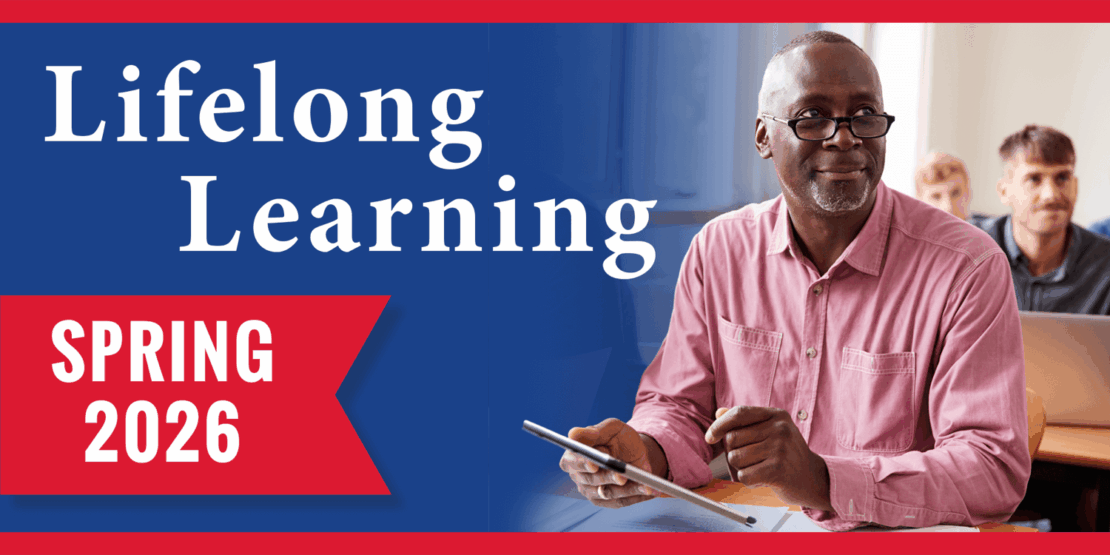
What is lifelong learning?
King University offers a select set of collegiate courses for adults aged 60 and over. Adult learners audit non-credit classes at King’s main campus in Bristol, Tennessee, free of charge.
Courses are taught by King professors in the College of Arts and Sciences and the School of Health & Professional Sciences. The courses cover a range of subjects including history, literature, Bible, theatre, photography, intelligence studies, politics, biology, criminal justice, English, fine arts, religion, philosophy, mathematics, and music.
By auditing the selected courses, adult students will be able to attend class without the worry of taking tests, while learning alongside traditional students in the classroom.
Important notes
- Lifelong Learners must enroll before classes start each semester. Requests to enroll late will only be considered under special circumstances.
- Books are not required for classes, but can optionally be purchased at books.king.edu or most online book retailers.
How to get started
- Download and complete your application
- Submit completed application to [email protected]
Available Lifelong Learning Courses
Dr. Alexander Brumlik | Thursday – 11:30 a.m. – 1 p.m.
This course covers both micro-economic theory (theories of demand, supply, production, cost, and market structures) and macroeconomic theory (theories of economic institutions, GDP, unemployment, and inflation).
Dr. Karen Shaw | Thursday – 11:30 a.m. – 1 p.m.
An examination of representative Victorian novels, considered in the light of their literary and cultural significance.
Professor Sam Henley | Tuesday – 8 – 9:30 a.m.
This course provides each student an opportunity to assess their wellbeing through a battery of physical fitness tests. Class content includes basic principles that support a physically active lifestyle. Each student is challenged to consider the personal, spiritual, and social responsibilities of maintaining an implementation of physical activity.
Staff | Thursday – 6 – 7:30 p.m.
A survey of the history of western art through investigation of the architecture, painting, and sculpture from the 17th Century through the present day.
Dr. Martin Dotterweich | Thursday – 1:10 – 2:40 p.m.
This seminar focuses on the methodology of historical research and writing through the medium of research projects based on primary and secondary source materials. An introduction to historiography and exploration of careers in history also serve as fundamental elements of the course.
Dr. William Linderman | Thursday – 1:10 – 2:40 p.m.
This course is a broad overview of the history of mathematics ranging from the origin of mathematics in early civilizations to advancements in the 21st century, focusing on interesting personalities and outstanding achievements.
Dr. Zachary Cooke | Thursday – 6 – 7:30 p.m.
A mixed choral ensemble that studies and performs a wide variety of music from various cultures and periods. Three hours of rehearsal per week is required.
Dr. David Mitchell | Monday, Wednesday – 4 – 5:30 p.m.
Exploration, interpretation and performance of concert band and smaller ensemble literature, including new and lesser-known pieces as well as standard literature. Three hours of rehearsal per week.
Dr. David Mitchell | Thursday – 1:10 – 2:40 p.m.
Exploration, interpretation, and performance of jazz ensemble/combo literature, including newer as well as standard literature. Emphasis is placed on historical as well as current popular performance styles. The group will also serve as standing pep band for home basketball games as well as a potential traveling group to aid in recruiting.
Professor Steven Sensenig | Mon., Wed., Fri. – 10:10 – 11:10 a.m.
The History of Jazz is intended to familiarize students with the unique American art form of Jazz. Course study encompasses pre-Jazz history through today’s current trends. A multi-media approach is a feature of this class as well as attendance at live Jazz performances allowing first-hand experience and application of course material.
Professor Brittani McInturff | Thursday – 1:10 – 2:40 p.m.
This course explores the roots of music that has been identified as American folk music in the context of history, geography, performance, song content, and circulation.
Dr. William Streetman | Thursday – 1:10 – 2:40 p.m.
A study of philosophical and religious theories of ethics and of their application to selected problems.
Dr. Dan Gray | Thursday – 9:40 – 11:10 a.m.
This introductory course to world politics examines the nation-state, power, war, and cooperation—in short, the nature of the international political system. This course surveys the predominant theoretical paradigms that explain the international political system, the historical evolution of the international political system, sources of conflict in world politics, international political economy, as well as features of international government.
Professor Heather Eisenhart | Mon., Wed., Fri. – 10:10 – 11:10 a.m.
This class is an exploration and hands-on study of the basic components of theatre, including acting, directing, playwriting, producing, theatre history, theatre design and technology. It is intended to introduce the student to all aspects of theatre by way of active participation including group projects and creative thinking. Theatre is an interactive art form, which requires active participation from the student. Class participation includes attending the University’s productions and discussing them: students will be encouraged to build their own opinions and share them with the rest of the class. This course will foster the students’ personal creativity while promoting an understanding of the theatrical process and the integral role of theatre in society.
For information on the Lifelong Learning at King program, contact the Office of Registration and Records at [email protected].
Lifelong Learner Student Status: King University is a Christian university with a distinct purpose. Admission to King university is granted on a non-degree student basis when a student is not pursuing a degree from King University and desires to enroll in a limited number of semester hours. Additional application information, when needed, may also be requested by the Office of Admissions or the Registrar.